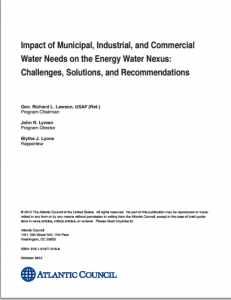Full Title: Impact of Municipal, Industrial, and Commercial Water Needs on the Energy Water Nexus
Author(s): Richard Lawson, John Lyman, and Blythe Lyons
Publisher(s): Atlantic Council
Publication Date: November 1, 2012
Full Text: Download Resource
Description (excerpt):
The Atlantic Council’s Energy and Environment Program released a report entitled: “Impact of Municipal, Industrial, and Commercial Water Needs on the Energy Water Nexus: Challenges, Solutions, and Recommendations,” which highlights the issues that were brought to light in the June 2012 workshop Water and Watts: the Potential to Save Energy and Water in the Municipal, Industrial and Commercial Sectors.
In the public’s eye, water may be an invisible component, but it is nonetheless crucial to provide the heat and electricity used throughout the American economy. Energy is also an invisible but essential component for making water available for municipal, industrial, and commercial users.
Even if not front and center in public discourse, there is an unbroken chain of energy for water and water for energy. Today, however, this circle may be broken if certain realities are not taken into account. The summer of 2012 highlighted some of these realities: Droughts lowered water levels in the Mississippi so that barges carrying transportation fuels went aground; floods damaged power-supply lines; and high temperatures warmed waters so much that some power plants had to reduce electricity production.
This report builds on the Council’s analysis in “Energy for Water and Water for Energy” and “Fueling America and the Energy Water Nexus: How and Why it Impacts the Nexus and What Next.” These reports examined both power production and transportation fuels connection to the nexus. This report expands on that work and examines the municipal, commercial, and industrial drivers behind the looming water crisis, namely, how water is used in each of these sectors and what impacts these operations have on water quantity and quality.
